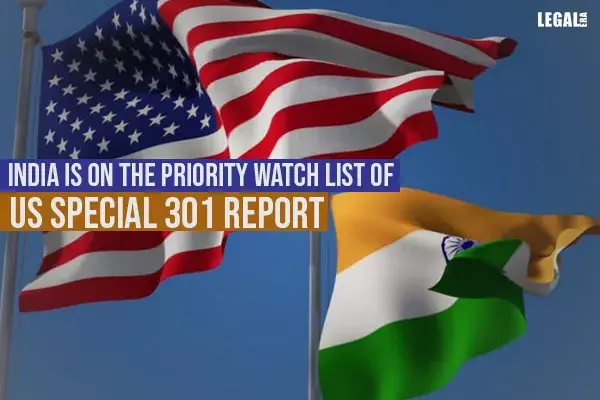India is on the Priority Watch List of US Special 301 Report
India, along with eight other countries has been placed in the Priority Watch List for IP protection and enforcement by;

India is on the Priority Watch List of US Special 301 Report India, along with eight other countries has been placed in the Priority Watch List for IP protection and enforcement by the United States. The countries are Argentina, Chile, China, Indonesia, Russia, Saudi Arabia, Ukraine, and Venezuela. The Special 301 Report released by US Trade Representative (USTR) flags countries that...
India is on the Priority Watch List of US Special 301 Report
India, along with eight other countries has been placed in the Priority Watch List for IP protection and enforcement by the United States. The countries are Argentina, Chile, China, Indonesia, Russia, Saudi Arabia, Ukraine, and Venezuela.
The Special 301 Report released by US Trade Representative (USTR) flags countries that form serious trade barriers concerning the IP laws of the country. This report points to the adequacy and effectiveness of US trading partners' protection and enforcement of intellectual property rights.
US Trade Representative Katherine Tai said, "These countries will be the subject of intense bilateral engagement during the coming year. Over the past year, India has remained inconsistent in its progress on intellectual property (IP) protection and enforcement. While India's enforcement of IP in the online sphere has gradually improved, a lack of concrete benefits for innovators and creators persists, which continues to undermine their efforts. India remains one of the world's most challenging major economies concerning protection and enforcement of IP."
This year, USTR has reviewed 100 trading partners for the Special 301 Report, keeping nine on the priority watch list and 23 on the watch list. The 23 trading partners on the Watch List are Algeria, Barbados, Bolivia, Brazil, Canada, Colombia, Dominican Republic, Ecuador, Egypt, Guatemala, Kuwait, Lebanon, Mexico, Pakistan, Paraguay, Peru, Romania, Thailand, Trinidad & Tobago, Turkey, Turkmenistan, Uzbekistan, and Vietnam.
Katherine said, "Intellectual property rights incentivize our creators, manufacturers, and innovators to invent new products and technologies. The laws, policies, and practices that protect those rights must appropriately balance the interests of creators with those seeking to use their creations. Failing to adequately and effectively protect those rights in foreign markets hurts the US economy, the dynamism of American innovators, and the livelihoods of our workers."
With the pandemic affecting globally, the USTR office stated that its top priority is saving lives and ending the pandemic. Reaffirming, TRIPS agreement and Public Health it stated that it respects trading partner rights and promotes access to medicine.
In India, the USTR said patent issues continue to be of particular concern as long-standing issues remain for innovative industries. Katherine added, "Moreover, patent applicants continue to confront costly and time-consuming pre and post-grant oppositions, long waiting periods to receive patent approval, and excessive reporting requirements. Stakeholders continue to express concerns over vagueness in the interpretation of the India Patents Act." Nevertheless, on the trading terms the US intends to continue to engage with India on IP matters, including through the United States-India Trade Policy Forum's Intellectual Property Working Group, she added.





